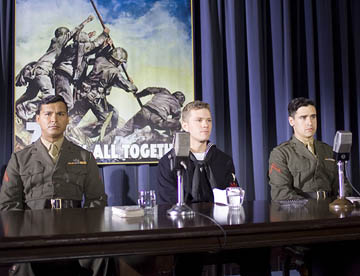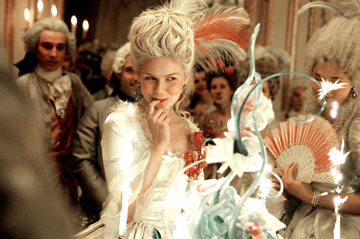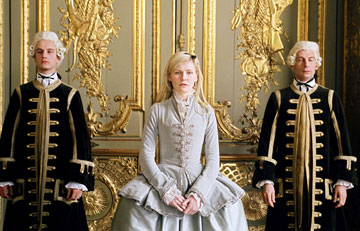Emeritus historians John Hope Franklin and Yu Ying-shih are the dual recipients of the $1 million John Kluge Prize for the Study of Humanity. Congrats to both. (I knew there was money to be made in this business!)
Category: History
Gates, See Clifford.
“It’s not quite clear what George W. Bush wants Robert Gates to do. But it’s doubtful Gates would have come back to Washington, from his pleasant perch as president of Texas A&M, if the job description read ‘staying the course on Iraq.’” Invoking Clark Clifford to make his case, Slate‘s Fred Kaplan suggests what incoming SecDef Robert Gates may be able to accomplish over the next two years.
The Reel World.
“Who’d have thought that while Gangs of New York‘s Amsterdam Vallon was killing Butcher Bill, down the road Abraham Lincoln was being kidnapped by Bill & Ted?” Another great link by way of Ted at The Late Adopter: The Movie Timeline, a.k.a. the History of the World according to film (and they’re looking for submissions.)
A Kingly Tribute.
“This sweltering summer of the Negro’s legitimate discontent will not pass until there is an invigorating autumn of freedom and equality. Nineteen sixty-three is not an end, but a beginning.” Ground is broken on the new MLK memorial, to be “built along the edge of the Tidal Basin, midway between monuments to Thomas Jefferson and Abraham Lincoln. It will be the first on the Mall honoring an African American and the first that does not memorialize a president or a war hero.” Great! As I’ve said before in this space, I’m all in favor of adding more historically-themed monuments to the Mall, and a tribute to Dr. King seems a particularly worthy addition to our nation’s central gathering place.
Northern Exposure?
“Historically, the major parties in America have yoked together the most disparate groups for long periods. The New Deal Democrats were a party of Northern liberals and Southern segregationists. But once Lyndon Johnson committed the Democrats to civil rights for African Americans, the white South up and left — a process that took 40 years to complete but that left the Democrats struggling to assemble congressional and presidential majorities and that converted the Republicans into a party where Southern values were dominant. Now the non-Southern bastions of Republicanism may themselves up and leave the GOP, seeing it as no longer theirs.” The American Prospect‘s Harold Meyerson sees potential for a realignment of northern moderates come Tuesday. Well, let’s hope. Chafee looks like toast (and he’s acting like it, too), but there are still a lot of undecideds — between 15 and 20% — in that Rhode Island race. And, lest we forget, our very own president, much as he’d like us to think otherwise, is a scion of the North as well.
Flagging Fathers.

As its conceit, the film follows the six soldiers pictured in the famous photograph of the Iwo Jima flag-raising, of which only three made it out alive: John “Doc” Bradley (Ryan Phillipe, better than usual), Rene Gagnon (Jesse Bradford), and Ira Hayes (Adam Beach, also very good). As it turns out, surviving hell on earth was only the first of their trials: Once the federal agitprop powers-that-be figure out what a spectacular image they’ve stumbled upon, these three soldiers — who in fact were putting up the second flag of the day — are forced into a whirlwind publicity tour across the United States to drum up support for war bonds. For Gagnon (and his ridiculously golddiggerish fiancee), this is an unexpected stroke of luck. For Bradley, this is grist for several artfully timed flashbacks of the actual battle. And for Hayes, a Pima Indian forced to confront not only the twin demons of racism and alcoholism but also his own feelings of guilt and inadequacy on the road, the war bond schmooze train seems like it might just be worse than the battlefield… (There’s also a framing device involving Bradley’s son (the author of the book) interviewing the participants in the story, but it’s basically Greatest Generation filler.)
Between the battle itself and the opportunity for trenchant social criticism offered by the war bond tour, this may sound like it has all the makings for a quality film. And, to their credit, the players all acquit themselves decently, with lots of good character actors (say, Robert Patrick, Harve Presnell, and look for Luther of The Warriors (David Patrick Kelly) in a cameo as Harry Truman) around to leaven the likes of grunts Paul Walker and Jamie Bell. That being said, virtually every character in Flags comes across as shallow and inert: From start to finish, Bradley’s a polite, well-meaning cipher, Gagnon a boyish opportunist, and Hayes a weepy drunk, and they’re the well-rounded ones. Moreover, as Ed Gonzalez of The House Next Door aptly put it, “the stink of Crash hovers over Flags of Our Fathers.” Cheap, reflexive sentiment is the order of the day here, and even scenes that should be powerful — say, Hayes being refused service at a white-only bar, or America learning of the death of FDR over the radio — are ruined by Haggis’s usual brand of in-your-face hokum, baldly sentimentalized and applied as a paste. By the time we’re forced to sit through some deathbed histrionics about daddys and heroes — a scene which would seem to undermine the film’s earlier emphasis on not valorizing war simply for its own sake — I’d pretty much completely checked out of the film. In short, Flags of our Fathers means well, I suppose…but it’s far too saccharine here to do its subject justice, and is basically a long-winded, ill-conceived bore.
Absolutely Sweet Marie.
 In my generally positive review of Lost in Translation a few years back, I complained that “this story could only have been written by deeply privileged people.” Well, Sofia Coppola’s newest film, Marie Antoinette, makes Lost in Translation seem like a working-class anthem. To be honest, I find my thoughts dwelling on Marie Antoinette in the few days since I saw it, and I’m liking it better in retrospect than I did while actually watching the movie. Still, Coppola’s film seems narrowly conceived to a fault. It conveys both the life-on-Mars quality of Versailles and the innocent decadence of privileged youth decently well (even if Antoinette was almost 35 by the time of the Revolution), but, in my humble opinion, the movie needed a lot more politics and a lot less in the way of shoes and pastries. As it is, despite all the wallowing in material delights, Marie Antoinette displays little in the way of a narrative arc, and, to my mind, it felt both unfinished and unsatisfying.
In my generally positive review of Lost in Translation a few years back, I complained that “this story could only have been written by deeply privileged people.” Well, Sofia Coppola’s newest film, Marie Antoinette, makes Lost in Translation seem like a working-class anthem. To be honest, I find my thoughts dwelling on Marie Antoinette in the few days since I saw it, and I’m liking it better in retrospect than I did while actually watching the movie. Still, Coppola’s film seems narrowly conceived to a fault. It conveys both the life-on-Mars quality of Versailles and the innocent decadence of privileged youth decently well (even if Antoinette was almost 35 by the time of the Revolution), but, in my humble opinion, the movie needed a lot more politics and a lot less in the way of shoes and pastries. As it is, despite all the wallowing in material delights, Marie Antoinette displays little in the way of a narrative arc, and, to my mind, it felt both unfinished and unsatisfying.
As the film begins, mirthful 14-year-old free spirit Marie Antoinette (Kirsten Dunst) has just been married off by her mother, the Empress Maria Theresa of Austria (Marianne Faithful), to the pudgy, young, and introverted dauphin of France, Louis XIV (Jason Schwartzman). And so we spend the first forty minutes of the film following young Marie’s introduction to the cauldron of social intrigue that is Versailles, where she is shuffled to and fro by her grim handler, the Comtesse de Noailles (Judy Davis, looking like the Borg Queen), and becomes the target of a whispering campaign due to her still-unconsummated marriage (a plot point that doesn’t work at all, given how far Dunst and Schwartzman are from 14 and 15 respectively.) At any rate, eventually Marie makes a few friends — most notably the Duchesse de Polignac (Rose Byrne) — and a few enemies, such as Madame Du Barry (Asia Argento), courtesan to Louis XV (Rip Torn). And she picks up several bad habits, including but not limited to gambling, shopping, all-night festivities, and the Count Axel von Fersen (Jamie Dornan), most of which are scored — usually pretty effectively — to post-punk or new wave tracks by Gang of Four (“Natural’s Not in It”), New Order (“Ceremony”), The Cure (“Plainsong”), and others.
 Of course, as we all know, the party can’t last forever, and Marie Antoinette’s reveries have a particularly nasty end. But the Revolution only takes up about fifteen minutes of the film here, and in fact is basically sidestepped (which feels a bit like making a movie about the Titanic and skipping the iceberg, but ah well.) Obviously, it was Coppola’s artistic decision not to wallow in the horrors that beset Antoinette’s final years, but that same lack of focus about anything other than good times at Versailles mars the rest of the film. Contrary to the figure portrayed here, Antoinette was engaged in the political issues facing her kingdom, particularly late in her reign. But, here’s she seems just a poor-little-rich-party-girl until the merde hits the fan in a big way in 1789. (There are a few scenes involving the French decision to aid the American Revolutionaries, I guess, but they seem unconnected to everything else going on and are in effect shoehorned in.)
Of course, as we all know, the party can’t last forever, and Marie Antoinette’s reveries have a particularly nasty end. But the Revolution only takes up about fifteen minutes of the film here, and in fact is basically sidestepped (which feels a bit like making a movie about the Titanic and skipping the iceberg, but ah well.) Obviously, it was Coppola’s artistic decision not to wallow in the horrors that beset Antoinette’s final years, but that same lack of focus about anything other than good times at Versailles mars the rest of the film. Contrary to the figure portrayed here, Antoinette was engaged in the political issues facing her kingdom, particularly late in her reign. But, here’s she seems just a poor-little-rich-party-girl until the merde hits the fan in a big way in 1789. (There are a few scenes involving the French decision to aid the American Revolutionaries, I guess, but they seem unconnected to everything else going on and are in effect shoehorned in.)
Which isn’t to say Marie Antoinette isn’t completely without merit. At times, it — much like The Virgin Suicides, Coppola’s first film — fashions out of the Antoinette story a haunting mediation on the doomed and fleeting transience of youth. (The New Order helps.) And there are several good performances in and around the margins, including Steve Coogan (always threatening to Tristam Shandy at any moment) as the Comte de Mercy-Argenteau and Danny Huston as Emperor Joseph II of Austria (although I do wish he’d thrown in a “hm-hm” to pay homage to Jeffrey Jones.) But, ultimately, this film is just too thin a take on Antoinette’s story to sustain interest over two hours. There’s barely any there there. Even subplots that should be in Coppola’s wheelhouse, given her choice of themes here, seem underdeveloped (most notably Antoinette’s rivalry with Du Barry — It happens, but doesn’t really amount to anything.) And, while the last few shots are undeniably haunting, they can’t justify the long and circuitous route it took to get there. I don’t have a problem with a sympathetic take on Marie Antoinette, per se, but it would’ve been nice to have seen a more fully-developed one.
Matters of State.
“The position of secretary of state is potentially the most fulfilling in the government short of the presidency. Its scope is global; ultimately it rests on almost philosophical assumptions as to the nature of world order and the relationship of order to progress and national interest.” In this past Sunday’s NYT Book Review, Henry Kissinger remembers his predecessor, Dean Acheson. “Acheson dealt with the issues Nixon put before him thoughtfully, precisely, without any attempt at flattery, in pursuit of his conception of national service and, unlike some other outside advisers, without offering advice that had not been solicited.“
Elephant’s End.
“Every revolution begins with the power of an idea and ends when clinging to power is the only idea left. The epitaph for the movement that started when Newt Gingrich and his forces rose from the back bench of the House chamber in 1994 may well have been written last week in the same medium that incubated it: talk radio.” As Foleygate continues to conflagrate and the FBI looks for answers, a TIME cover story wonders if the Republican Revolution of 1994 is dead. Yep.
Forth the 300.
Ok, it’s still basically just a lot of flexing and screaming. Nevertheless, the new trailer for Zach Snyder’s 300 is out, and it’s an adrenaline shot…one of the more effective previews I’ve seen in awhile. (And “Tonight we dine in Hell!” seems like it might be an apt catchphrase for all kinds of situations.)
